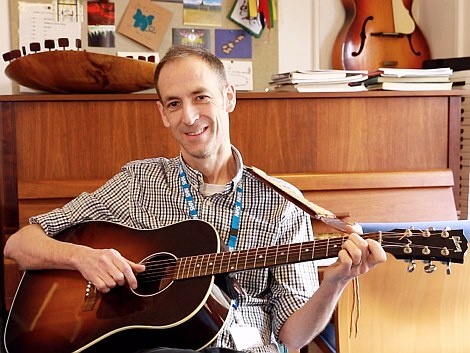Tom Crook, Music Therapist
08:00 Arrive at Sobell House, check my emails and prepare the music room for the day’s sessions. Catch-up with colleagues in the different departments across the hospice.
09:15 Attend morning handover on the Inpatient Unit. This is a time to find out what might have happened overnight to the patients I am currently working with, as well as learning about any new admissions who might benefit from music therapy.
09:30 Attend Day Service handover. Our Day Centre patients attend weekly, so this meeting can take a little longer as we ascertain what has been happening in a patient’s life since we last saw them a week ago.
10:00 My first session today is with Angela*, a lovely woman who attends at Sobell House as an outpatient for music therapy. As well as a recent cancer diagnosis, she also has a complicated heart condition which means that any further cancer treatment is becoming less likely. She uses today’s session as a place to reflect on the losses she has had to endure because of her ill health and the uncertainty she now faces as her life changes. Angela finds comfort in her faith and loves to sing Gospel songs, and we have recently been composing her own song. Therapeutic, creative songwriting can often bypass the cognitive thought process and allow a person to get in touch with more unconscious feelings. The lyrics she comes up with explore thoughts of gratitude toward her husband, children and wider family and friends, and we begin to set this to a Gospel-influenced musical setting.
11:00 I then make a home visit to a new referral from one of our community nurses. Ted* is an older gentleman, living in rural Oxfordshire, and the community team are worried that he is becoming somewhat isolated by his ill health. I meet him in his stone farmhouse and he tells me how he misses having a sense of purpose after living a very active life in the countryside, working in the agricultural industry since he was a boy. He warns me that he is not very musical but is soon talking about favourite songs and singers that he used to enjoy at local steam-rallies and country fairs. With a handy laptop, we are able to listen to some of these songs and the music soon evokes important memories for Ted allowing him a space to reminisce. By the end of my visit, Ted agrees to come in to Sobell House, see the music room and think about potentially attending the Day Service. This may well be enough to give his week a focus and allow him a sense of purpose. And I hope that further music sessions might offer Ted a means to continue this life review work we tentatively began today.
13:00 As well as being a Music Therapist, I am also the team lead for the psycho-social department, encompassing Social Workers, a Discharge Coordinator, a Benefits Advisor, an Art Therapist and the various students we might all have on placement at any one time. So after a quick sandwich, my afternoon begins with a team strategy meeting to decide how we will best cope with the recent Covid-19 virus. I tell them the latest thinking from the House and the Trust and how, for the welfare of our patients and staff, we can only make home visits to those with urgent or essential needs, after assessing the situation by phone.
14:00 Mike* is a Day Centre patient with a complex lung condition who I have been working with, on and off, over the last year. He uses his session today to continue a piece of legacy work he has been making for his 2-year-old daughter. He is genuinely concerned about the Covid-19 virus and knows that if he were to contract it, he might not recover. The song he has composed is his way to simply remind his daughter that he was her father, that he loved her, and that he does not want her to forget him.
15:00 Once the Day Centre has finished and the patients have gone home with our volunteer drivers, I manage to catch-up with some patients on the ward. One of them, Paul*, is a keen guitarist and I find him quietly playing a guitar I had left in his room a couple of days earlier. Paul has been having difficulty with pain management and has been using PRNs to address this. PRNs are the extra pain killers that our patients might take between their prescribed medication, the letters standing for ‘pro re nata’ which roughly translates to ‘as necessary’. It transpires that, since Paul has had the guitar to play, he has been less reliant on PRNs. I explain to him the benefits of playing music, how it is a known analgesic as well as a mindful distraction for us all.
16:00 A time to write up my notes for the day before leaving, self-administering my own musical choices for the drive home.
No two days are the same for me at Sobell House. One day I might be attending meetings with the various multi-disciplinary teams from departments across the House, the next I could be performing a song written by a patient that they asked me to sing for them at their funeral. But that is the nature of our relationship with music; it has the ability to soundtrack our days, summarise our thoughts, help us feel we belong, and give our lives meaning.
*Patient names have been changed for anonymity.
